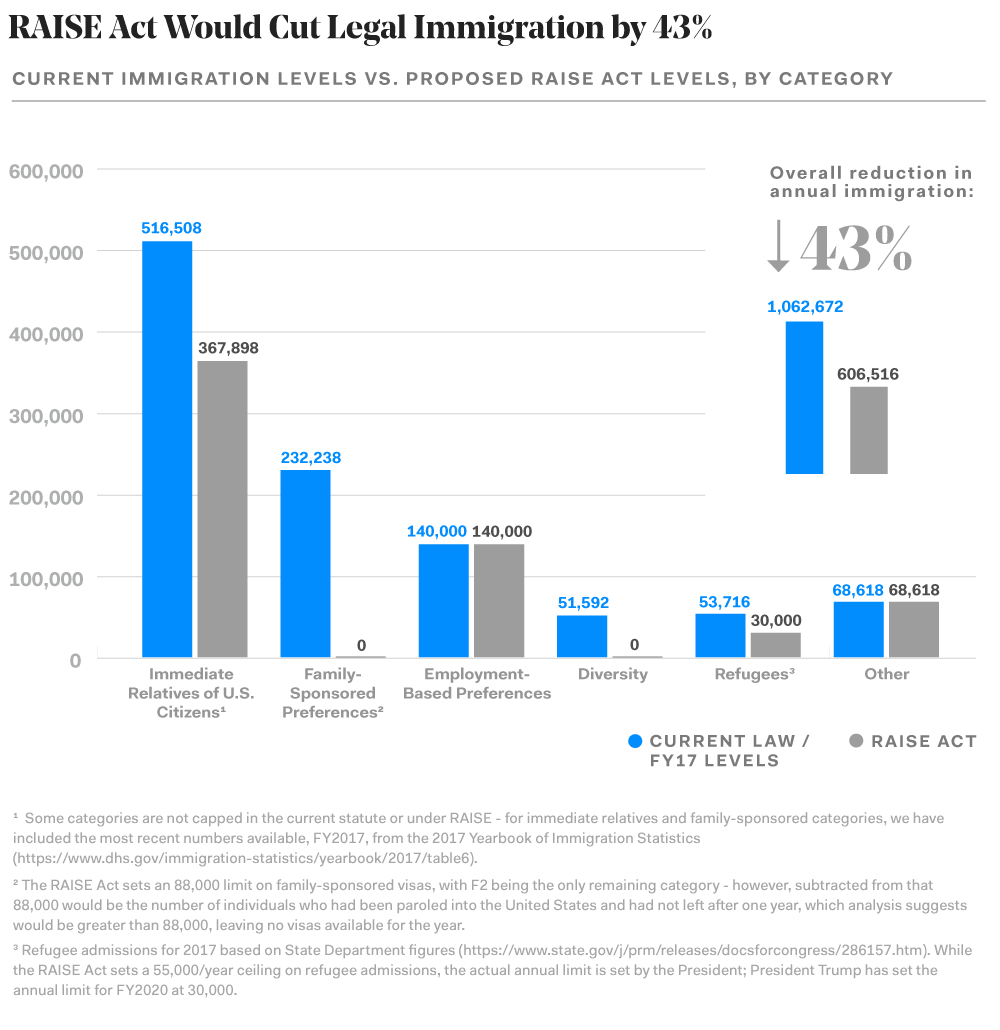How to Lose the Numbers Game


On April 10, Senators Tom Cotton (R-AR), David Perdue (R-NC), and Josh Hawley (R-MO) reintroduced the RAISE Act (S.1103, the Reforming American Immigration for Strong Employment Act), legislation that would permanently reduce legal immigration to the United States in half by: eliminating the diversity visa, eliminating or restricting eligibility for immediate family and close relatives of U.S. citizens and permanent residents, and imposing a permanent cap on refugees; the bill would also replace the current employment-based system with a points-based system.
Last Congress, the U.S. Senate voted on similar cuts to legal immigration levels as part of the Secure and Succeed Act. That bill received the support of the President, but 60 members of the Senate rejected these reductions to legal immigration when put to a vote. At the time, almost none of the bill amendment's cosponsors could defend the cuts to legal immigration as sound policy. Senator Perdue, a sponsor of both the RAISE Act and the Secure and Succeed Act, claimed the bills were not actually trying to cut immigration levels, saying, “There was never an intent — the motive was not necessarily a reduction — we actually need to increase the worker percentage of the population we are bringing in now.”
Contrary to the name of this bill, the RAISE Act would not net a single additional immigrant over current levels, merit-based or otherwise; instead, it would reduce legal immigration levels by nearly 43% initially, and then further — upwards of 50% — as fewer immigrants naturalize and are therefore eligible to sponsor immediate relatives. And despite the author’s claims, the overwhelming majority of experts agree that cutting legal immigration will do little to raise wages for U.S. workers. This proposal would not strengthen either the national economic interests of Americans or employment opportunities for most individual Americans.

However, the authors of the RAISE Act continue to promote the demonstrably false premise that there is a “fixed pie” limiting jobs in the U.S., where every job filled by an immigrant is a job taken from a native-born American, suggesting that our current immigration system suppresses wages and causes unemployment for American workers. However, the consensus among economists and policy analysts who have looked at the impact of immigrants on wages and employment for Americans is that immigrants do not prompt low wages or unemployment, and that there is no such “fixed pie” of jobs. In reality, immigrants increase opportunities and create new jobs for American workers, and cutting immigration would shrink the economy for all Americans.
As economists and analysts explain:
There is “little support for the view that inflows of foreign labor have reduced jobs or Americans’ wages.” – University of Pennsylvania, Wharton School of Business, The Effect of Immigration on the United States Economy.
“A large body of academic economic research has found that immigration has a relatively small effect on U.S-born American wages and their employment prospects. For wages impact, the estimates are that immigrants either lower the wages of some American workers by about 2 percent or raise them by about 2 percent in a dynamic economy. The employment effects vary little but, like wages, the effects are small and clustered around zero.”- Alex Nowrasteh, Cato Institute. Immigration’s Real Impact on Wages and Employment,
“There is almost no evidence of anything close to one-to-one crowding out by new immigrant arrivals to the job market in industrial countries.” – David Roodman, The Domestic Economic Impacts of Immigration.
Indeed, in April 2017, nearly 1,500 economists, including six Nobel Prize winners, publicly rejected this “zero-sum” view of the impact of immigrants on the economy when they sent a letter to President Trump explaining that immigration brings diverse skill sets that keep our workforce flexible, help companies grow, and increase the productivity and job opportunities of American workers.
And on the RAISE Act specifically, experts and economists predict it would only raise wages by $0.23 in the next ten years, and then only by $0.16 in the next 20 years, outweighed by a loss of 4.6 million jobs over 20 years, increased deficits, reduced revenue to OASDI trust funds and Social Security, and a $1.39 trillion cut to GDP.
Directly contrary to these independent and expert analyses, the RAISE Act adopts simplistic and almost silly gauges of financial and employment value to the United States to select immigrants. Specifically, the measures employed in the RAISE Act to identify sufficient financial means to merit immigration to the United States are woefully out of touch.
Instead, points are given under RAISE for either (i) having a job offer with a salary 150%, 200% or 300% above the median salary in the state where the job is located, or (ii) making an investment of $1.35m or $1.8m, giving inordinate preference to large national and global firms and wealthy investors. Unlike our current system, the RAISE Act does not recognize as a general matter a job offer being paid prevailing wages – the average wage paid to the majority of employees in a certain area – as a means to protect American workers.
This is, perhaps a fatal flaw, because it would price out small or medium-sized local businesses from hiring immigrant workers by requiring they pay wages much higher than the average and beyond what they could afford. In many states, these arbitrary wage requirements above the median salary would disqualify work done by employees at start-ups and small businesses, as well as non-profits and universities as they will not be able to meet these high-salary requirements.
In conclusion, it simply is not the case, as some incorrectly suggest, that immigrants cause “stagnating prospects of much of our workforce.” For that reason, and because that suggestion is the informing principle underlying the legislation introduced by Senators Cotton, Perdue and Hawley, the RAISE Act cannot be the base policy prescription to fix our broken immigration system.
Get in touch with us:
Andrew Moriarty
Deputy Director of Federal Policy
Tell the world; share this article via...
Get Involved
We need your help to move America forward. Learn what you can do.